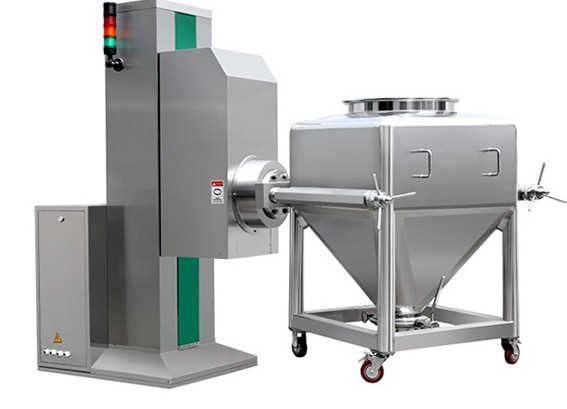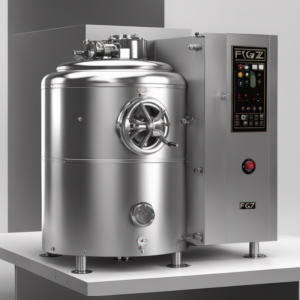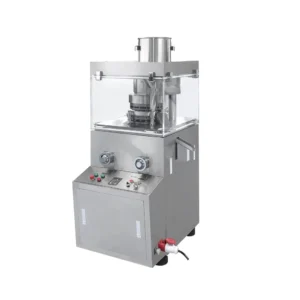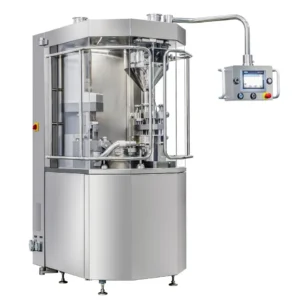Description
| Specification | Description |
|---|---|
| Capacity | Typically ranges from 500 to 2000 liters |
| Material | Stainless steel construction |
| Blender Type | Rotating or tumbling |
| Rotation Speed | Variable, typically adjustable |
| Power Supply | Electric motor |
| Control System | PLC (Programmable Logic Controller) |
| Safety Features | Emergency stop button, interlocks, overload protection |
| Cleaning | Designed for easy cleaning and sanitization |
| Discharge Mechanism | Outlet valve or chute |
| Loading | Manual or automated |
| Dimensions | Varies depending on capacity and design |
| Optional Features | Vacuum or pressure capabilities, blending timers |
Introduction of The IBC Bin Blender
The pharmaceutical manufacturing sector is a dynamic one; where speed, precision, and safety are key. This industry has made great strides in science and technology to improve regulatory compliance while also increasing productivity. The IBC Bin Blender is an example of such advancements in modern pharmaceutical machinery. Its sophisticated design and complex operation mechanisms make blending processes more efficient, ensuring that they are consistent, dependable, and meet regulatory standards.
Principles of Operation
IBC Bin Blender functions based on a complicated blend concept that utilizes several precise mechanisms to achieve uniform mixing. The principle of tumbling motion is at its core whereby the IBC bins containing pharmaceutical ingredients rotate around various axes. This movement causes rotation for gentle powder or granules blending as it ensures even distribution of ingredients across the mixture.
The blender’s chamber consists of strategically placed baffles and blades to facilitate particle movement optimization and prevent segregation. It is also possible to program the blender regarding speed as well as time duration according to the formulation required at any given moment. With this feature, it can be used for blending different types of pharmaceutical products right from simple mixtures to very complex formulations.
Applications
IBC Bin Blender’s versatility makes it indispensable at various stages in the production process within the pharmaceutical industry. These applications range from early-stage development through large-scale production including:
Granulation: Mixing granules to get specific particle sizes with uniformity.
Tablet Compression: Powders used for tablet formulations with exactitude dosage uniformity have been blended here.
Powder Blending: Multiple powdered ingredients brought together homogeneously for final formulations;
Ingredient Dispersion: The dissipation thus becomes homogeneous throughout mixtures so that there may not be any clustering effect once it reaches excipients;
Quality Control: Samples can be prepared using this mixer for quality control analysis purposes which are mandatory according to regulations concerning drugs;
The flexibility associated with these bin blenders enables them to fit well in various product flow systems thereby improving the efficiency and quality of products.
How it Works and Principles
This bin blender is based on well-engineered designs and advanced control systems. It has the following features:
Precise Control: The blender allows one to adjust its mixing parameters like speed, rotation direction, blending time, and many others. This helps in ensuring batch to batch reproducibility,
Hygienic Design: It is made of materials that are used in the pharmaceutical industry, which are easy to clean. In this way, there is the minimization of risk about contamination among products.
Integrated Safety Features: Interlocking systems, overload protection mechanisms as well as emergency stop buttons are some of the safety measures installed in them for operators’ safety and equipment preservation.
Automation and Connectivity: The majority of today’s IBC Bin Blenders have automation functions coupled with several connectivity options that enable them to be linked up with production systems; hence they can be remotely monitored or controlled.
Advantages
Adopting an IBC Bin Blender will confer multiple advantages upon drug makers:
Enhanced Efficiency: Automation combined with precise control attributes inherent in this machine accelerates manufacturing processes by reducing manual work thereby shortening production times.
Improved Product Quality: Uniform distribution of ingredients during blending ensures that product quality remains constant at all times including drug potency levels.
Compliance and Traceability: On top of meeting regulatory requirements through documentation, the appliance has thus been built according to such regulations’ standards;
Cost Savings: Over some time these cost implications enhance profitability because more units get covered within a given duration due to reduced writing-off while their chances for maintenance therein remain minimal;
Flexibility and Scalability: The mixer possesses a high degree of flexibility allowing manufacturers to handle different formulation sizes from small batches / large volumes depending on market trends at each moment.
Future Trends
With that, the future of IBC Bin Blenders in pharmaceutical manufacturing looks set for more creativity and advancement. Among them are the following:
Integration of Industry 4.0 Technologies
Enhance intelligence and connectivity of IBC Bin Blenders, will involve integrating artificial intelligence, machine learning, and IoT (Internet of Things) technology facilitating predictive maintenance, real-time monitoring, and adaptive control.
Enhanced Flexibility
The forthcoming models of IBC Bin Blenders will endeavor to improve on flexibility to allow for a wide range of formulas and production processes enabling swift response to market requirements by pharmaceutical manufacturers.
Focus on Sustainability
This aspect is expected to drive the development of eco-friendly IBC Bin Blenders with low energy consumption and environmental footprint towards sustainability in pharmaceutical manufacturing.
Customization & Personalization
For instance, as we increasingly embrace personalized medicine, these devices will also be customized to support precise dosing and customization of different drug formulations to suit individual patients’ needs in terms of medical prescriptions.
Regulatory Compliance & Data Integrity
In essence, continuous improvement in software systems and data analytical tools shall ensure regulatory compliance as well as integrity when using IBC Bin Blenders. This shall make it easier during an audit or other quality assurance processes.
Frequently Asked Questions (FAQs)
1. What is an IBC Bin Blender?
An intermediate bulk container bin blender is an advanced machine used for powder blending or granules mixing during the manufacture of pharmaceutical formulations; A blend chamber rotates where ingredients contained in IBCs are mixed homogeneously along several axes within it.
2. How does an IBC Bin Blender work?
It consists of a tumble blender such that rotating intermediate bulk containers containing powder ingredients within the containment simply facilitate a gentle blending process that would lead to uniform aggregation between all particles uniformly distributed over mixtures.
3. What are the applications of an IBC Bin Blender?
It can be applied at different stages throughout the process of pharmaceutical manufacturing because it is versatile. For example, in granulation, tablet compression, powder blending, ingredient dispersion, and quality control through sample preparation.
4. What are the key features of an IBC Bin Blender?
It allows for precise control of blending parameters; it has a hygienic design to prevent cross-contamination between mixtures; integrated safety features and automation capability for seamless integration with manufacturing systems.
5. How does an IBC Bin Blender benefit pharmaceutical manufacturers?
Benefits that come with adopting IBC Bin Blenders include enhanced efficiency, improved product quality, compliance with regulatory standards, cost savings from increased productivity as well as the ability to handle different batch sizes and formulations.
6. What are the future trends in IBC Bin Blender technology?
These trends include integrating Industry 4.0 Technologies into predictive maintenance and real-time monitoring; enhancing flexibility to accommodate a broader range of formulas; focusing on sustainability; customization for personalized medicine; regulatory compliance advancements and data integrity.
7. Is an IBC Bin Blender easy to clean and maintain?
Basically yes, most have smooth surfaces that are easy to clean while others come with cleaning programs that automatically remove remaining particles from corners or other hidden parts. Therefore regular maintenance plans along with comprehensive documentation will help improve performance while ensuring compliance with relevant legislation.
8. Can an IBC Bin Blender be customized for specific manufacturing needs?
Yes, they can always be custom-made according to the manufacturer’s specifications such as blending parameters or container size also by integrating into existing production lines like many high-end models.
9. How does an IBC Bin Blender ensure product quality and consistency?
The blender’s ability to control blending parameters and mix uniformly the ingredients into a homogenous mixture ensures that the powder is evenly mixed, thus, ensuring high product quality as well as dosage uniformity.
10. Can IBC Bin Blenders be used for both large-scale and small-scale production?
Yes, it is possible to use IBC Bin Blenders on a small-scale or large-scale production. They can be easily adjusted depending on the particular production capacity or formulation by their scalability, adaptability as well as programmable characteristics.





Reviews
There are no reviews yet.